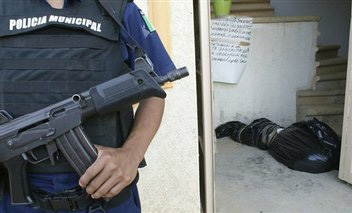
|  |  |  Editorials | Issues Editorials | Issues  
Study Links Mexico Drug Enforcement to More Violence
 Martha Mendoza - Associated Press Martha Mendoza - Associated Press
go to original
April 28, 2010


| | Police in southern Mexico guard a house near the Pacific coast resort of Acapulco, Saturday April 24 2010, where the dismembered bodies of three men were found in plastic bags. A message allegedly left by the killers near the bodies blamed the dead men for an April 14 shooting in Acapulco that killed six people. (AP/Bernandino Hernandez) |  |
Mexico City — The surge of gunbattles, beheadings and kidnappings that has accompanied Mexico's war on drug cartels is an entirely predictable escalation in violence based on decades of scientific literature, a new study contends.

A systematic review published Tuesday of more than 300 international studies dating back 20 years found that when police crack down on drug users and dealers, the result is almost always an increase in violence, say researchers at the International Centre for Science in Drug Policy, a nonprofit group based in Britain and Canada.

When communities get tough on drug crime, that drives up the black market profits, prompting fierce battles to control the lucrative trade, their study says. And when powerful and successful drug bosses are taken out, it's all too common for more brutal and less sophisticated criminals to step in.

"Law enforcement is the biggest single expenditure on drugs, yet has rarely been evaluated. This work indicates an urgent need to shift resources from counterproductive law enforcement to a health-based public health approach," said Gerry Stimson, executive director of the International Harm Reduction Association which is hosting a conference this week in Liverpool, England, where the study was released.

As happened with Mexico's all-out drug crackdown launched when President Felipe Calderon took office a little over three years ago, murders shot up during the U.S. prohibition on liquor in the 1920s and during Colombia's crackdown on its drug gangs in the 1990s.

In 87 percent of the studies reviewed, intensifying drug law enforcement resulted in increased rates of drug market violence. Some of the studies included in the report said violence increases because power vacuums are created when police kill or arrest top drug traffickers. None showed a significant decrease in violence.

U.S. Drug Czar Gil Kerlikowske, asked about the findings, said the U.S. government is shifting its emphasis toward prevention and treatment of drug abuse, but he said the prohibition on drugs must remain and enforcement must continue.

"I don't know of any reason that legalizing something that essentially is bad for you would make it better, from a fiscal standpoint or a public health standpoint or a public safety standpoint," he said.

The former drug czar, John Walters, said the researchers gravely misinterpret drug violence. He said spikes of attacks and killings after law enforcement crackdowns are almost entirely between criminals, and therefore may, in a horrible, paradoxical way, reflect success.

"They're shooting each other, and the reason they're doing that is because they're getting weaker," he said.

Walters warned against blaming law enforcement.

"The cause of the violence is not the law. The cause of the violence is the criminals and the viciousness in which criminal activity is carried out," he said.

Calderon recognized when he became Mexico's president in December 2006 that smashing drug gangs was going to be costly.

"We are, at the end of the day, putting our lives on the line in this battle," he told The Associated Press soon after taking office.

Since then, Mexico has sent more than 45,000 soldiers into battle with cartels and seen an unprecedented wave of drug violence that has killed more than 22,700 people, most of them victims of disputes between rival gangs. But the dead also include police, soldiers, politicians and journalists as well as innocent civilians caught in shootouts.

As the toll rises, Calderon is coming under increasing criticism for his strategy. But a core constituency still applauds him.

"This government made a difficult but courageous decision to take on the cartels," said Luis de la Barreda, director of the Citizens' Institute for Crime Studies, an independent advocate for better security and accountability in law enforcement.

U.S. authorities have repeatedly emphasized their support for Mexico's drug interdiction efforts.

David Danelo, a senior fellow at the Foreign Policy Research Institute in Philadelphia, warned that authorities must guarantee the rule of law.

"If the police do not rule the streets, others will," he said. |

 |
|  |



